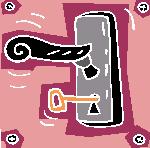lock that revolving door and go?
 Dixie and Bob are both casually employed after being laid off permanent jobs, and have been empty nesters and revolving door parents for over three years. They are beginning to get fed up with it all.
Dixie and Bob are both casually employed after being laid off permanent jobs, and have been empty nesters and revolving door parents for over three years. They are beginning to get fed up with it all."As long as you remain in the empty nest," says Dixie, "you will forever go through the revolving door syndrome - even to the point of raising grandchildren - and this is fine if it’s what you want to do or if there’s no other alternative, but it’s not what I want to do."
"There comes a time," says Dixie, "when the empty nest - the old family home - becomes a burden in physical, financial and sometimes emotional terms and you begin to dread the calls from adult children who by now should be living independently but will never achieve that milestone as long as mom and dad are there to house them every time they have a hiccup in their lives."
"Empty nests, by their very nature," explains Dixie, "are often big old homes that rattle a bit once the kids have left home. Empty rooms still have to be cleaned and aired and maintained and that's totally unnecessary and unproductive work."
There's also the financial burden of maintaining a place that is far too big for your present needs. Old homes like Dixie’s need a lot of maintenance - roofs start to leak, electrical wiring wears out, pipes burst, drains block, timberwork gets dry rot, etc. And every three years the whole place needs to be painted. Then there's the back yard.
"It's lovely," sighs Dixie, "but who in their right mind needs a huge back yard that needs grass to be cut every month, and weeds to be pulled, and leaves to be raked? And the pool? I can’t remember the last time I swam in it, but it still needs cleaning."
"To their credit, the kids share a lot of home maintenance chores when they come home," says Dixie, "but when it’s just Bob and I at home we either have to do this work ourselves or pay someone to do it for us. It's either hard work, or expensive work."
Bob and Dixie don’t want the bother of it any more. It has become a real burden to them. There are other things they'd rather be doing, and other things they'd rather be spending their dwindling savings on.
And then there's the emotional cost of remaining in the empty nest.
Dixie explains that it's all very well rattling around the place, keeping the kids' rooms almost as shrines to their childhood but it’s like a mausoleum.
"Memories are lovely," she says, "but we really don’t need shrines to keep them alive. Memories live best in our minds, and will always be with us, and it’s about time our children started behaving like the adults they are."
Also, as Dixie and Bob discovered when they redecorated and changed one of the children's old rooms into something else - in their case a sewing room - the visiting adult child resented the change. It was her bedroom and she expected it to remain just as she left it for as long as it pleased her - not her parents!
"It’s understandable, I suppose," says Dixie, "that some adult children develop a proprietary attitude towards the old home, especially their old rooms, and this is another reason why it’s not smart to stay living in the old family home."
Dixie and Bob believe that as long as you remain in the empty nest you will never be completely emotionally free to start a new life.
They believe that it makes sense physically (too much work), financially (too much money) and emotionally (too many memories) to sell the old home and start a new life in a new environment.
Their house is fairly substantial, so if they downsize to a small apartment they might have enough money left over for an early retirement - and that’s something that pleases them both.
At 59 and 55, Bob and Dixie’s job prospects are not good, and they are miserable with the low wages they receive from casual work.
"At our age," sighs Dixie, "we deserve a better existence than the one we’ve got, and selling the family home is the only way we can get it. We’re going to retire early before the costs of maintaining the old house--and being revolving door parents--get us further into debt!"
"It's time to lock that revolving door and start looking after ourselves!"

<< Home